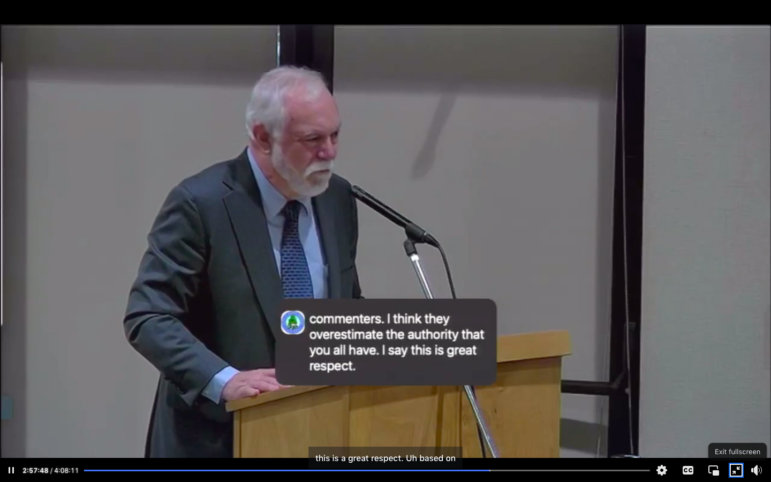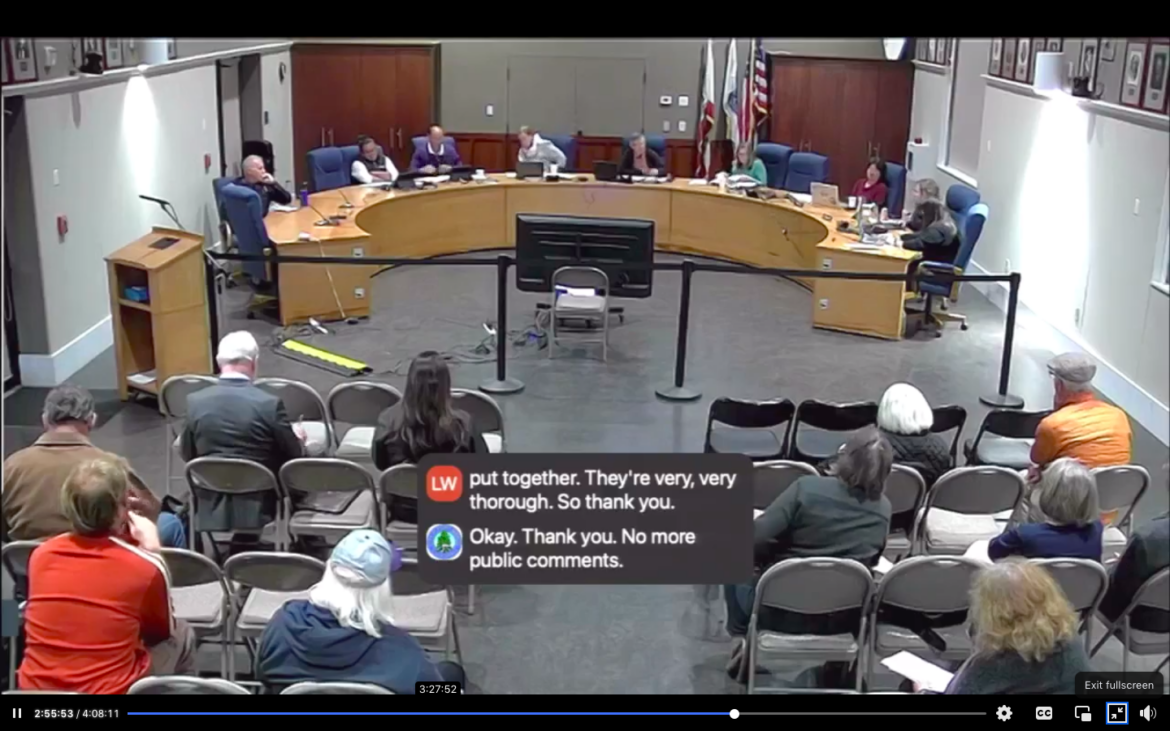FORT BRAGG, 6/6/23 — The plan to build a Grocery Outlet store at the end of South Franklin Street in Fort Bragg was approved by a 4-0 vote at a special one-item City Council meeting Monday night. The Environmental Impact Report was approved by a 3-1 vote at the same meeting. Appealing to the California Coastal Commission remains a possibility.
The vote was 4-0 because Mayor Bernie Novell recused himself as he lives near the proposed store site (he did not attend the meeting). Councilmember Tess Albin Smith dissented on the first vote of the night about the EIR but did approve Grocery Outlet obtaining a Coastal Development Permit from the city. The meeting lasted four hours, and the council discussed two dozen conditions staff recommended for the approval, related to traffic, tree-planting and species selection, a requirement for a generator and many more.
The speakers, split between highly motivated supporters of the chain and less enthusiastic critics, were polite. Despite worries the dispute could boil over, the last two meetings on Grocery Outlet were conciliatory in tone by both sides. Two speakers, novices to zoning and planning, were outraged that the city would dare ask anything of a business. Many speakers had suggestions for the chain, such as that the store pledge not to use automated checkers. Another popular idea was for the company to pay for the installation of a covered bus stop. More bike racks were also pushed.
In addition, city staff suggested many conditions, including requiring that Grocery Outlet have a generator on hand for frequent coast power outages, the use of shared parking for patrons of the harbor and other nearby businesses, and traffic signals. Safeway employees spoke about their union and benefits package. According to employees at nearby stores, Grocery Outlet pays minimum wage.
“This is the most agreeable company I have ever seen approach the city of Fort Bragg,” said realtor Paul Clark. “You want this? Okay. You want that? Okay. I’ve never seen anything like it. So I just don’t understand the naysayers. I just don’t understand what they would really want.”

He did suggest that limits be placed on automated checkers. “How about ask Grocery Outlet to commit to no automatic checkouts? Those are jobs that are constantly lost. Then pass an ordinance in the city forbidding them for grocery stores. Nothing else. Just grocery stores.”
Jim Moose, a partner in the Sacramento law firm that represents Grocery Outlet in the application process, told the council the city’s powers were limited. He told the audience that suggestions about how the store should be run (such as no automated checkers) were nobody’s business but Grocery Outlet’s. He mentioned the legal authorities the council had, such as local ordinances and the Coastal Act, and then told the council that some of the discussion was out of the city’s control. “None of those gives this particular local government body [the Council] the authority to say who should work at this business, whether they should join unions or the kind of equipment that can be used within the store. This is basically a land use decision.” He added that he intended no disrespect.
He continued, “The amount of discretion that the council has is a function of the particular types of approvals we need. One of which is Design Review, and just by the words `design review,’ it doesn’t suggest that you have this power to extract a lot of economic concessions from us for the privilege of coming into the community.”
Yet city councils do commonly demand all kinds of concessions to the public they represent.
Among the findings of the EIR was possible negative impacts on migratory birds. That resulted in the following mitigation demand from the city: “Preconstruction surveys for active nests of special-status birds shall be conducted by a qualified biologist in all areas of suitable habitat within 500 feet of Project disturbance. Surveys shall be conducted within 14 days before commencement of any construction activities that occur during the nesting season (February 15 to August 31) in a given area.“
The old building has attracted bats, and the city demanded that the builders of the store make sure they weren’t killing off an entire bat population by knocking it down. “A bat survey shall be conducted by a qualified biologist prior to demolition of the existing on-site building. The surveys shall be conducted from dusk until dark. If the weather during the bat survey makes visual observations difficult or impossible, another survey shall occur when the weather is appropriate for visual observations. If no bats or maternity roosts are found in the existing building, no further mitigation is required.”
Moose indicated that bat roosting, migratory birds and noisy trucks were within the power of the council but not store management issues. “I have a little bit of an old-fashioned notion of property rights that if a property owner owns land, and wants to come in with a use that is consistent with the zoning of the general plan, [it] is not an opportunity for the local government to try to exercise great power over how that business is going to be operated,” Moose told the council.
Rahsaan Freese, a local businessman, was one of a half dozen speakers who was very enthusiastic that Grocery Outlet build a store in Fort Bragg. “I think the focus needs to be on providing food to people who don’t have access to it, fundamentally,” said Freese. “Grocery Outlet is not one of those like Walmart that will go into a community with the lowest prices, run everybody out of business and then suddenly jack up the prices. They don’t do that.”
Grocery Outlet is currently promising 15 to 25 jobs. The chain does not have bakeries or floral shops or delis that would warrant higher paid employees; only the managerial staff has higher salaries. One representative of the applicants, apparently tired of suggestions about traffic and site parking and building angles from the audience, remarked he didn’t know there “were so many traffic engineers in Fort Bragg.”
Unlike other stores where a shopper can plan to buy the same things on their list each time, Grocery Outlet’s inventory, beyond produce and meat, is a surprise each time. The chain is strong on publicity and has numerous YouTube videos promoting the business, officially and from boosters. These describe a culture that depends entirely on the local owner. Owners work long hours and often do jobs that require specialists, such as the meat department. Grocery Outlet has a local owner, making it different than other chains. While the store is still under the control of Grocery Outlet, and the owner has little choice in the highly varied inventory that arrives from Grocery Outlet, that person can also contract with other suppliers and add products. For example, the Ukiah Grocery Outlet store carries local beers including a selection of North Coast Brewing products priced similar to other grocery stores. Grocery Outlet representatives feel the use of local owners means their stores are partly locally owned. The stores qualify locally for small business programs from the state, designed for businesses with less than 50 employees, while its two larger grocery competitors in Fort Bragg do not.
Consultant Marie Jones told the council that the project can be appealed to the Coastal Commission because it is less than 300 feet from Noyo Harbor bluffs, which the Coastal Commission considers part of ocean bluffs.
The official actions taken Monday night were several, including adopting and certifying the California Environmental Quality Act Findings and the Mitigation Monitoring and Reporting and adopting a resolution approving the Coastal Development Permit that will allow the old building to be demolished, a new one built, and a parcel merger to create the site for the grocery chain. The city has five boxes of files on Grocery Outlet at city hall. In addition, the city maintains a page about the Environmental Impact report process Projects | Fort Bragg, CA. There is also information about Monday’s meeting and the Coastal permit process at https://cityfortbragg.legistar.com/View.ashx?M=A&ID=1104410&GUID=AA86FD34-B886-4692-97FD-7C25D338855A





Just another step in the near-universal push to make every beautiful place a garbage dump of chains, strip malls, parking lots, and rolling trash. If it follows the usual trend of these chains, the “15” employees will soon become a couple part-timers and a few overworked, underpaid “managers” working long hours. Thanks for the update.